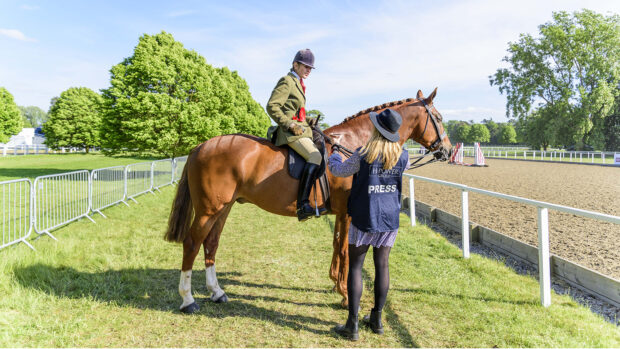Just imagine being based with an equestrian idol, someone whose time and expertise is beyond the reach of almost everyone. As a working pupil, this scenario suddenly becomes possible, giving people the chance to improve their riding while they watch and assist true horsemen in every aspect of their work. And the gossip is fabulous.
Working pupils fit in on the yard as grooms, but, traditionally, instead of working for a wage they receive training, livery for their horse and their keep. Some pupils pay on top of this and others are paid a minimal wage in addition. And more than just having straight lessons, the pupil can learn by watching the rider schooling and riding at shows.
On top of riding, they learn how to manage top competition horses and run this type of yard. Even when they are not having lessons they are given passing instruction when riding or working with the horses.
Most working pupils are school leavers who stay for their gap year before attending university, or those who aspire to setting up their own yard. On average, they stay between six months and two years, depending on the opportunities that arise.
The set-up is popular, as, by paying in training rather than sterling, the host expert is better off, too.
National dressage champion Peter Storr was a working pupil for Jennie Loriston-Clarke. He believes the system opens doors.
“You need a name. It’s like getting a place at Harvard or Oxford. If you have that on your CV, people are impressed,” he says. “For me, the experience was invaluable.”
It’s easy to be dazzled by the idea of working for a pro, having regular instruction from an expert, raising your game through daily intensive training, learning how to make the winning difference in a horse’s care or preparation, having expert eyes helping you warm up at competitions…
That’s the idea, anyhow. The trouble is that the proper balance between being a worker and a pupil can be hard to achieve, and many’s the time a working pupil has found themselves working ungodly hours for their equestrian deity, when weeding the garden out of hours was not quite what they had in mind.
One show jumping working pupil complains that she rarely had a day off in her six-month stint because if anyone was ill her holiday got scrapped. She worked all hours and never received the lessons she was promised; the nearest she got was occasional instruction while the rider schooled his own and clients’ horses.
An eventing working pupil says she was never allowed to choose her day off, which meant missing out on a family wedding. The rider spent weeks away at a time on holiday or events abroad, during which time the working pupil would have no lessons despite doing the same amount of work.
“The word ‘working’ is there for a reason, it’s not a year off,” says Sam Cutts, 21, who isn’t one to shy away from hard graft.
Sam is now in her third year at Cambridge reading veterinary science and plans to contest Badminton this year.
“Being a working pupil won’t suit the prima donnas of the world. You must be prepared to pull your weight,” she points out.
Sam spent a year with international eventer Lucy Wiegersma in 2003.
“I’d done six A’ levels and wanted a break before starting six years of my degree,” says Sam, who got so much out of the experience that she returns every holiday.
The terms and costs of being a working pupil can vary massively from rider to rider, and, in part, by what the “hosting rider” wants to achieve by taking one on. Show jumper Paul Crago uses working pupils primarily to help take the burden off his permanent staff.
“I charge a livery fee and for lessons and accommodation. If they’re helping out the staff, I’ll pay the minimum wage — it’s not fair to expect people to work for nothing,” he says.
This is a common working pupil set up now and can end up costing the pupils a fair amount, although they are not expected to do the same quantity of work.
Equestrianism is one of few areas where employees still take cash-in-hand illegally, so it is not surprising that “gentleman’s agreements” still exist. However, since anyone who does not receive at least the minimum wage is entitled to inform the Department of Trade and Industry of the fact, employers won’t usually risk getting caught.
When Peter Storr was a working pupil for Jennie Loriston-Clarke, it was very different. “You can’t expect people to work the hours we did any more,” he says.
Peter pays his working pupils £90 a week on top of all their horse’s costs, their accommodation and bills.
“Some people left, thinking it was too much hard work, and came back later saying it wasn’t such a bad deal after all,” he says. “Working pupils aren’t always realistic. Some turn up and expect a lesson on your grand prix horse.”
The amount of riding you do will depend on the type of horses on the yard and your ability. Eventers will have more fitness work to do, but Peter’s pupils might hack out.
“Show jumpers need someone at home capable of schooling the horses, which you’re not likely to find with a working pupil, they need more experience,” says Paul Crago. “They come out with starry eyes and expect to be jumping grade As. It’s a bit of a shock to find they’re asked to get up at 7am and muck out.”
Veteran showman Robert Oliver takes working pupils for 6-12 months. Like many riders, he takes people on a month’s trial. Others will interview potential candidates, usually wanting to see them ride or at least handle horses before taking them on for training. Robert’s pupils get livery, lessons and accommodation, and start work at 7.30am.
“It is mutually beneficial if the pupil is prepared to work hard. They must show enthusiasm,” he says. “In return, we help them produce and ride their own horse and they learn what it takes to prepare a show horse from start to finish.”
Being a working pupil is a sound option if you want a career in horses or if you know it’s the only chance you’ll get. But pick who you work for carefully, get stuck in, and leave if you feel exploited.




